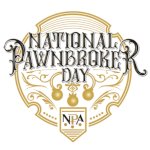National Pawnbroker Day Date in the current year: December 6, 2026
 National Pawnbroker Day, also known as National Pawnbrokers Day, is celebrated annually on December 6. It was created to recognize one of the oldest professions and dispel common misconceptions about pawn shops.
National Pawnbroker Day, also known as National Pawnbrokers Day, is celebrated annually on December 6. It was created to recognize one of the oldest professions and dispel common misconceptions about pawn shops.A pawnbroker is an individual or business (called a pawn shop) that offers secured loans to people using personal property items as a collateral. Pawn shops typically accept relatively valuable items such as jewelry, gold, silver, coins, electronics and appliances, firearms, musical instruments, etc. If the pawner does not redeem their property within a certain period of time for an agreed-upon amount (loan plus interest), the pawnbroker may sell the item to recoup the loan value.
Pawnbroking has a very long history. There is evidence of pawn shops existing in China as early as the 5th century. These pawn shops were established, owned, and operated by Buddhist monasteries. Ancient Greek and Roman civilizations also had pawn shops that were typically operated by private individuals.
Even though the early Roman Catholic Church prohibited charging interest on loans, pawn shops were common in medieval Italy; some of them were run by Jews, others by Christians. From Italy, they spread to other parts of Europe. Interestingly, pawnbrokers didn’t loan money exclusively to the poor; there are records of English kings pawning their jewels to raise money for war, for example, King Edward III in 1338 and King Henry V in 1415. Queen Isabela of I Castile is believed to have pawned her jewelry to finance Christopher Columbus’s 1492 voyage.
Despite the spread of pawn shops, pawnbrokers were usually treated with suspicion. The situation began to change in the late 18th century, when the first laws regulating pawnbroking and protecting pawnbrokers who inadvertently sold stolen items were adopted in Britain.
Today, pawnbroking is strictly regulated in most parts of the world. In the United States, for example, pawnbrokers must obtain a license and comply with local, state, and federal regulations and laws that determine the loan period and the amount of interest. In some jurisdictions, pawnbrokers are required to inform the police about all newly pawned items on a daily basis to prevent the sale of stolen property.
There are approximately 10,000 pawn shops throughout the United States, employing around 35,000 individuals. Most of American pawn shops are family-owned small businesses, yet they collectively contribute about 3$ billion to the national economy. People who resort to pawn borrowing typically do it because pawn loans do not require a credit check and do not affect the customer’s credit if they default on the loan.
National Pawnbroker Day was created by the National Pawnbrokers Association (NPA), a non-profit trade association that represents and protects independent qualified pawnbrokers. The holiday is celebrated on December 6 because it is the feast day of Saint Nicholas of Myra who is venerated as the patron of patron saint of pawnbrokers, among other occupations. National Pawnbroker Day kicks off National Pawnbroker Week filled with in-person and virtual events.
- Category
- Professional Days
- Country
- USA
- Tags
- National Pawnbroker Day, holidays in the US, professional observances, pawnbrokers, pawn shops, Saint Nicholas of Myra